Wat is een Bess in batterijopslag?
Terwijl je de wereld van zonne -kracht en energie -onafhankelijkheid verkent, U zult vaak het acroniem "Bess" zien." Wat betekent Bess eigenlijk in de context van batterijopslag? Is het gewoon een technische naam voor een batterij, of is het iets meer? Het begrijpen van deze term is cruciaal voor iedereen die wil investeren in een moderne, Intelligente energieoplossing.
In batterijopslag, Bess staat voor het opslagsysteem voor batterijenergie. Het belangrijkste woord hier is "Systeem." Een bess is niet alleen de batterij zelf; het is de hele, Volledig geïntegreerde oplossing die de batterijmodules omvat, Een essentieel batterijbeheersysteem (GBS), een stroomconversiesysteem (Pc's) of omvormer, Controlesoftware, en alle noodzakelijke veiligheidscomponenten. Het is een complete krachtpatser, Ontwikkeld om op intelligente wijze betrouwbare elektriciteit op te slaan en te leveren.
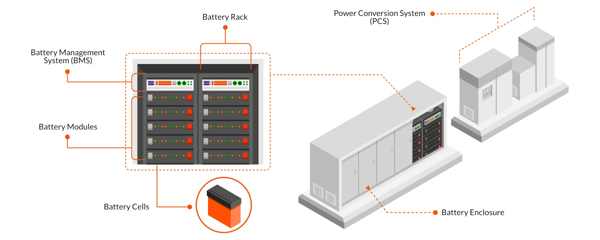
Bij Gycx Solar, We bieden niet alleen batterijen; We ontwerpen en installeren uitgebreide BESS -oplossingen. Deze holistische benadering zorgt ervoor dat elk deel van uw systeem in perfecte harmonie werkt. Laten we duiken in enkele van de meest voorkomende vragen over wat een Bess -batterijopslag Systeem houdt in.
Hoeveel kost een opslagsysteem van een BESS -batterijen energie -opslag?
Bij het overwegen van een BESS1. voor uw huis of bedrijf, De eerste vraag gaat meestal over de totale investering. Welke factoren dragen bij aan het uiteindelijke prijskaartje van een van deze geavanceerde opslagsystemen?
De totale kosten van een BESS variëren sterk op basis van de grootte, technologie, en functies. Voor een residentiële installatie in Singapore, U kunt verwachten dat een systeem van hoge kwaliteit zal variëren S $ 15.000 voor een kleiner instapsysteem tot ruim S $ 50.000 voor een grotere, premium -opstelling. De belangrijkste stuurprogramma's van deze kosten zijn de totale energie van het systeem capaciteit (in kWh), zijn kracht uitgang (in KW), het merk en de kwaliteit van de componenten (Vooral de LFP -batterijen en hybride omvormer), en de complexiteit van de installatie.
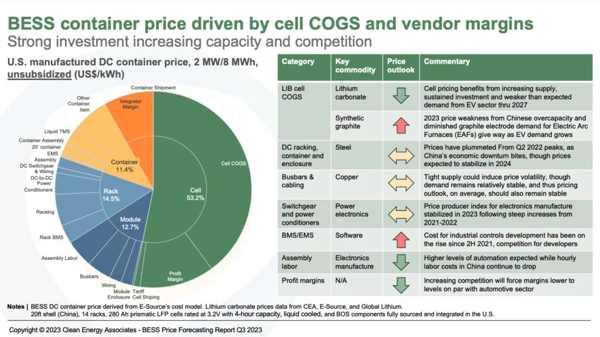
Duik dieper: Inzicht in de totale investering
Een BESS is een langdurig actief, en de prijs weerspiegelt de geavanceerde technologie binnenin. Dit is wat de kosten goedmaken:
- Batterijmodules (per kWh): Dit is de grootste uitgave. Het zijn de kosten van de werkelijke energieopslagcapaciteit.
- Power Conversion System (Pc's) / Hybride omvormer (per kW): Dit is het brein en het werkpaard van het systeem, Beheer van de energiestroom tussen uw zonnepanelen, accu, thuis, en het rooster. Hogere vermogensbeoordelingen en meer geavanceerde kenmerken verhogen de kosten.
- Batterijbeheersysteem (GBS): Terwijl geïntegreerd in de batterijmodules, De verfijning draagt bij aan de waarde en kosten.
- Balans van het systeem (Bos): Dit omvat de fysieke behuizing (als een muurbevestiging eenheid of een kast), bedrading, Veiligheid verbroken, en andere noodzakelijke hardware.
- Installatie & Inbedrijfstelling: Dit is een kritieke component. Professionele installatie door gecertificeerde technici zorgt ervoor dat uw systeem veilig is, code-conform, en werkt efficiënt. In Singapore, Dit omvat werk dat wordt gedaan door een erkende elektrische medewerker (Lew).
- Stimulansen: Hoewel Singapore geen grote directe subsidies heeft zoals sommige landen, Het financiële voordeel komt van het drastisch verminderen van uw afhankelijkheid van de aankoop van dure rasterelektriciteit, wat leidt tot aanzienlijke besparingen op lange termijn.
Bij GYCX Solar, Wij bieden duidelijk, Gedetailleerde voorstellen die al deze kosten afbreken, u helpen de krachtige waarde op lange termijn van uw investering in energiezekerheid te begrijpen.
Hoeveel kost een Bess per kWh?
Bij het vergelijken van verschillende BESS -opties, Je ziet vaak de metrische "kosten per kilowattuur" ($/kWh). Dit kan een nuttige manier zijn om waarde te meten, Maar wat betekent het echt, En wat is een typisch bereik?
De geïnstalleerde kosten per kilowattuur (kWh) voor een kwaliteitsresidentieel Bess -batterijopslag systeem in 2025 meestal varieert van Ongeveer S $ 800 tot S $ 1.500 per kWh. Dit cijfer wordt berekend door de totale geïnstalleerde kosten van het systeem te nemen en het te delen door de totale energiecapaciteit van de batterij in KWH. Deze kosten per kWh kunnen vaak dalen voor grotere commerciële systemen als gevolg van schaalvoordelen. Het is belangrijk om te onthouden dat deze metriek niet alleen de batterij omvat, Maar de omvormer, software, installatie, en alle andere componenten.
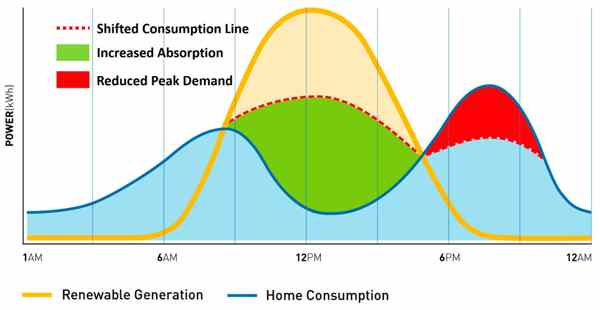
Duik dieper: Kijkt voorbij de $/kWh Stickerprijs
Hoewel de kosten per kWh een nuttig startpunt zijn, Het vertelt niet het hele verhaal. Dit is waarom het varieert en wat je nog meer moet overwegen:
- Systeemgrootte: Een groter 20KWH -systeem zal een hogere totale kosten hebben dan een 10kWh -systeem, Maar de kosten per kWh is vaak lager omdat de kosten van de omvormer en installatie niet verdubbelen.
- Merk en kwaliteit: Premium merken met vastgestelde reputaties voor betrouwbaarheid, Geavanceerde softwarefuncties, en betere garanties hebben natuurlijk hogere kosten per kWh.
- Batterijchemie: Systemen met hoogwaardige LFP (Lithium-ijzerfosfaat) Cellen kunnen een andere kostenstructuur hebben dan die welke andere chemie gebruiken, Maar ze bieden een superieure veiligheid en een veel langere levensduur.
- AC-gekoppeld VS. DC-gekoppeld: Het type BESS -architectuur (of het zijn eigen omvormer heeft of er een deelt met de zonnepanelen) kan de algehele systeemkosten en, daarom, de kosten per kWh.
- Levenslange waarde: Een goedkoper systeem met een kortere levensduur of een slechte garantie kan een lage initiële kosten per kWh hebben, maar een veel hogere totale eigendomskosten over 10-15 jaren. Het is cruciaal om de Lichte opslagkosten (LCOS), Welke factoren in de levensduur en efficiëntie van de batterij.
GYCX Solar Story: "We adviseren klanten altijd om naar levenslange waarde te kijken. Een iets goedkopere Bess met alleen 3,000 Cycli moeten jaren moeten worden vervangen voordat een hoogwaardig systeem is beoordeeld 6,000 cycli. We richten ons op het bieden van oplossingen met de beste waarde op lange termijn, Niet alleen de laagste initiële prijs per kWh."
Wie maakt Bess -batterijen?
Als je een bess koopt, die daadwerkelijk de componenten binnen maakt? De industrie heeft twee hoofdtypen belangrijke spelers: De bedrijven die de kernbatterijcellen produceren, en de bedrijven die die cellen integreren in een compleet systeem.
De BESS -industrie betreft 1) Celfabrikanten, Gigantische wereldwijde bedrijven zoals KAT, DOORD, LG -energieoplossing, en Samsung SDI die de fundamentele lithium-ioncellen produceren, En 2) Systeemmerken en integrators leuk vinden Tesla, Hekelen, Groeit, en deskundige oplossingsaanbieders zoals wij bij Gycx Solar. Deze bedrijven nemen de hoogwaardige cellen, Pak ze in batterijmodules, en integreren ze met een BMS, een compatibele omvormer, en intelligente software om een compleet te maken, Gecertificeerd BESS -product.
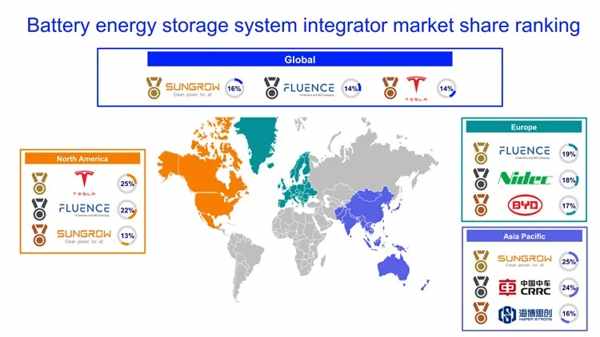
Duik dieper: De BESS -supply chain
Laten we eens kijken naar de rollen:
- De celfabrikanten: Dit zijn de titanen van de batterijwereld. Bedrijven gevestigd in China (zoals CATL en BYD) en Zuid -Korea (zoals LG Energy Solution en Samsung SDI) zijn de dominante krachten, Productie van de overgrote meerderheid van 's werelds hoogwaardige LFP en andere lithium-ioncellen. Ze zijn de bron van de kerntechnologie.
- De systeemmerken/integrators: Dit is de laag die consumenten meestal interageren met.
- Grote merken: Bedrijven zoals Tesla (met zijn powerwall) of Enphase (met zijn IQ -batterij) Ontwerp hun eigen compleet, vaak eigendom, systemen rond cellen afkomstig van de belangrijkste fabrikanten. Ze creëren een naadloos, merk ecosysteem.
- Omvormers fabrikanten: Bedrijven zoals Growatt, Solis, of Solaredge ontwikkelen vaak hun eigen batterijmodules of werken samen met batterijmakers om systemen te maken die gegarandeerd perfect werken met hun omvormers.
- Providers van deskundige oplossing (zoals GYCX Solar): Onze rol is om uw deskundige gids te zijn. We zijn niet gebonden aan een enkel merk. We dierenarts en selecteren de best-in-class componenten-van hoogwaardige LFP-batterijmodules tot betrouwbare hybride omvormers van toonaangevende namen zoals Growatt en Huawei-en ontwerpen een Bess die perfect is aangepast aan uw behoeften. We bieden de cruciale expertise in systeemontwerp, integratie, en professionele installatie.
Wat is het beste opslagsysteem voor thuisbatterijen?
Met zoveel uitstekende opties op de markt, Hoe bepaal je wat de "het beste is" Batterijopslagsysteem voor u voor u? De waarheid is, Er is geen enkel systeem dat voor iedereen het beste is.
De "beste" Home Battery Storage System is degene die het beste past bij uw specifieke behoeften, begroting, en thuisomgeving. Voor huiseigenaren die prioriteit geven aan een slanke, Alles-in-één ontwerp en een eenvoudige gebruikerservaring, A muur gemonteerde batterij Zoals een Tesla Powerwall of Growatt APX HV is vaak een uitstekende keuze. Voor degenen die een grotere nodig hebben, zeer aangepast, of meer schaalbaar systeem, een modulair Rack Mount Battery Oplossing is misschien de betere optie.
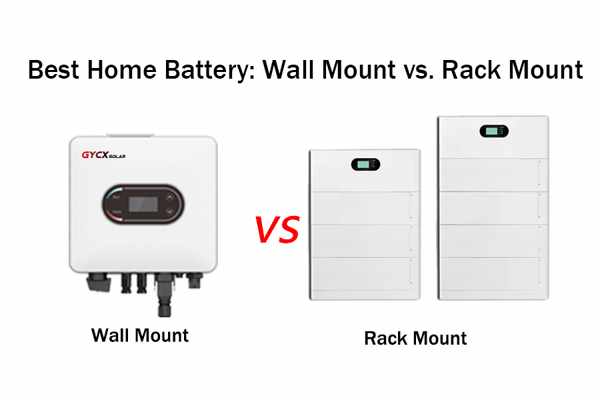
Duik dieper: Kiezen tussen muurbevestiging en rekmontagesystemen
Laten we de twee leidende benaderingen vergelijken om uw "beste te vinden" fit:
- Muur gemonteerde batterijsystemen:
- Het beste voor: Huiseigenaren die esthetiek waarderen, Heb een geschikte wandruimte, en wiens energie nodig is bij de aangeboden standaardcapaciteiten (typisch 5-15 kWh per eenheid).
- Pluspunten: Hebben vaak een strakke, Appliance-achtig ontwerp dat er geweldig uitziet in een garage- of bijkeukenruimte. Velen zijn "alles-in-één" Systemen die de batterij omvatten, GBS, en omvormer in een enkele behuizing, het uiterlijk vereenvoudigen.
- Nadelen: Kan minder flexibel zijn als u een zeer specifieke of zeer grote capaciteit nodig hebt. U wordt mogelijk vergrendeld in het ecosysteem van een enkele fabrikant voor software en toekomstige uitbreidingen.
- Modulaire rekbatterijsystemen:
- Het beste voor: Huiseigenaren met hogere energiebehoeften, Degenen die maximale flexibiliteit en schaalbaarheid willen, of die met een speciale hulpprogramma -kast of ruimte om een apparatuurrek/kast te huisvesten.
- Pluspunten: Zeer schaalbaar - u kunt eenvoudig meer 5kWh -modules toevoegen, Bijvoorbeeld, Om uw systeem in de loop van de tijd te laten groeien. Vaak meer kosteneffectief per kWh voor grotere systemen. Kan meer flexibiliteit bieden bij het kiezen van een compatibele omvormer van derden.
- Nadelen: Het rek of de kast zelf neemt vloeroppervlak in en heeft een meer industriële esthetiek, die misschien niet geschikt zijn voor alle huizen.
- Hoe GYCX Solar u helpt te kiezen:
Ons proces is om u eerst te begrijpen. Wat zijn uw doelen? Is het back-upkracht voor essentiële belastingen of veerkracht bij het hele huis? Probeert u de besparingen op uw elektriciteitsrekening in Singapore te maximaliseren? Heeft u ruimtebeperkingen? Op basis van uw antwoorden, We kunnen het "beste aanbevelen" systeem voor jou, of het een strak is muur gemonteerde batterij of een krachtige en schaalbare rekmount Bess -batterijopslag oplossing.
Een bess is meer dan alleen een batterij; Het is een compleet, Intelligent systeem dat u controle geeft over uw energie. Door te begrijpen wat een Bess is, zijn kosten, en de verschillende soorten beschikbare systemen, U kunt een krachtige investering doen in de Future van uw huis.
Als u klaar bent om te onderzoeken hoe een BESS kan worden aangepast aan uw behoeften, Ons expertteam bij GYCX Solar is er om te helpen. We ontwerpen en installeren hoogwaardige batterij-energieopslagsystemen die veiligheid leveren, betrouwbaarheid, en langetermijnwaarde. Neem vandaag nog contact met ons op!
Inzicht in het concept van BESS helpt u om batterijgerelateerde gegevensconcepten beter te vergelijken en te begrijpen. Dit helpt u het product te selecteren dat het beste bij uw behoeften past bij ons bedrijf. ↩
